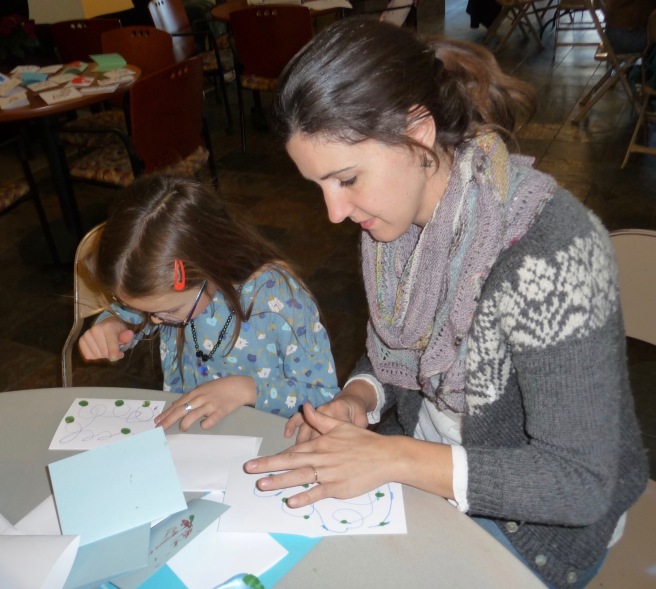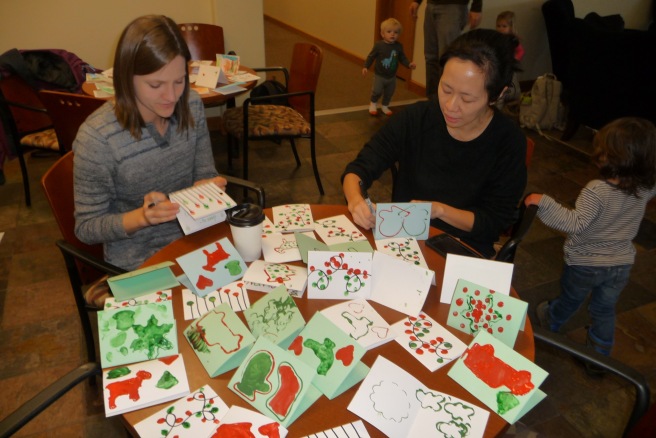Some holiday traditions are both beloved and painful at the same time. Perhaps you delight in getting together with extended family, but there’s always that one crazy (angry/ racist/ sexist/ loudmouth/ abusive) uncle who seems to relish making everyone else feel uncomfortable or downright miserable. I have similar feelings about one of my newer holiday traditions: making Christmas cards for immigrants in detention.
For the third year in a row now, I’ve participated in making Christmas cards for asylum seekers who are in prison for no other reason than coming legally to the U.S. in fear for their lives and requesting asylum. This year friends from my church, two local colleges, and the immigrant community came together to hand-make the Christmas cards. ICE has strict guidelines for what they will and won’t accept and distribute: absolutely no stickers, tape, glue, or glitter, no envelopes, and only one or two of six approved greetings may be written in the cards. No signatures or organization names are allowed, only “your friend” or “tu amigo.”
My friends who organized the event this year did a brilliant job planning card crafting that was fun for both very young children and adults of all ages. Designs with white crayon served as wax resist for the children to paint over with watercolors. Illustrations of lights and ornaments were completed with fingerprints by children and adults alike. And paints, crayons, and colored pens and pencils were available for those who preferred to go freestyle with their designs. Christmas music played while students and professionals, young and old, parents and retirees, created and wrote 570 beautiful Christmas cards.
What could possibly irritate me about this new tradition? In this scenario, the racist, bullying uncle is Uncle Sam: the U.S. government. The fact that the U.S. regularly jails people who come legally to this country seeking safety from horrible violence and fear in their own countries is unconscionable. I’ve worked inside a detention center for women and children; I know the horror these neighbors are fleeing.
Casa de Paz is a hospitality house for immigrants who have recently been released from ICE detention. The Casa is a place where these immigrants can sleep in a comfortable bed, eat a delicious meal, and receive help making travel arrangements to reunite with their families. Every evening volunteers from the Casa show up at the ICE facility to welcome asylum seekers to Colorado. Casa volunteers will deliver the Christmas cards to the ICE detention center for distribution. They will also include a candy bar with each card, candy bars that ICE requires be purchased within the detention facility.
Our event’s organizer provided space within the creative process for participants to express what they were feeling while making the cards. She herself has worked in the past for an immigration service in south Texas, so she expressed feelings of grief for the treatment of immigrants. An undocumented community leader expressed that she was so struck by what her people are experiencing in detention that she could scarcely imagine wishing them a merry Christmas, knowing that it most certainly will not be merry for them. Several of us expressed gratitude for the opportunity to do something tangible that might bring a modicum of joy to hurting people.
We spent a moment in silence praying for the cards to do just that, and for the recipients to know that there are friends on the outside who care for them and want to welcome them to our country. May our efforts carry with them hope, love, joy, and welcome to our new neighbors.
If you’d like to learn more about Casa de Paz or donate to their ongoing work welcoming immigrants, or help purchase 1,000 candy bars, you may do so here:
https://www.casadepazcolorado.org








